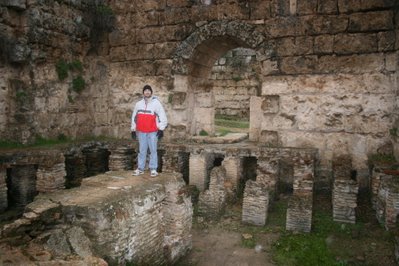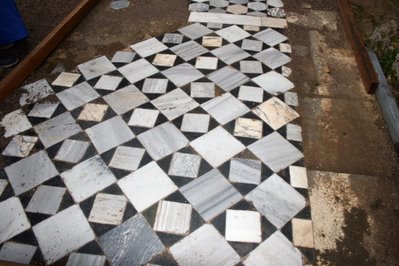Paul and Barnabas arrived here on their first journey. Most of the remains date to the second half of first to second century so it’s beyond Paul’s time except for the main city gates, Paul definitely would have walked through them.

We're standing next to the gates Paul and Barnabas walked through at the entrance to the city.
Perga is where John Mark left Paul and Barnabas on the first journey. Historically scholars have come up with different theories as to the reason for his departure. These theories range from persecution to illness to homesickness. However our traveling archeologist, Dr. Mark Wilson, has a different theory. He believes that the conversion of Sergius Paulus in Cyprus was a turning point northward in a journey that should have taken them to North Africa. Dr. Wilson believes that Paul was originally headed to Alexandria based on the fact that Antioch on the Orontes was first evangelized by North African Christians and it had a heavy North African population so it would make sense that Paul’s commissioning church would send him there. However when Sergius Paulus became a Christian, things changed. Since Pisidian Antioch is the hometown of Sergius Paulus and he would have had major connections there. (This also helps explain why Paul and Barnabas didn’t evangelize in Perga during their first trip through here like they did in other cities but rather they went straight through to Pisidian Antioch). Dr. Wilson believes that John Mark may have left Paul and Barnabas in anger because he wanted to go to North Africa and not Pisidian Antioch. (This would also correlate with church history stating that John Mark later went on to evangelize and was subsequently martyred in Alexandria). While there’s no way to be sure either way, I think it makes for an interesting theory.
Although many ruins are post-Paul (just barely) it is clearly a very social culture. I can easily picture Paul discussing theology and evangelizing in a public bathhouse. The agora (marketplace) is such an integral part of the city, there is no other conclusion to make but that Paul was a street evangelist.

The agora at Perga.

Remains of a bathhouse.
Looking at everything and picturing it complete with roofs, covered in marble, etc, I can see how beautiful these cities were. We have nothing like them in today’s world. It’s definitely our loss.

This is the floor of the bathhouse. The entire city was covered in various marble patterns.
No comments:
Post a Comment